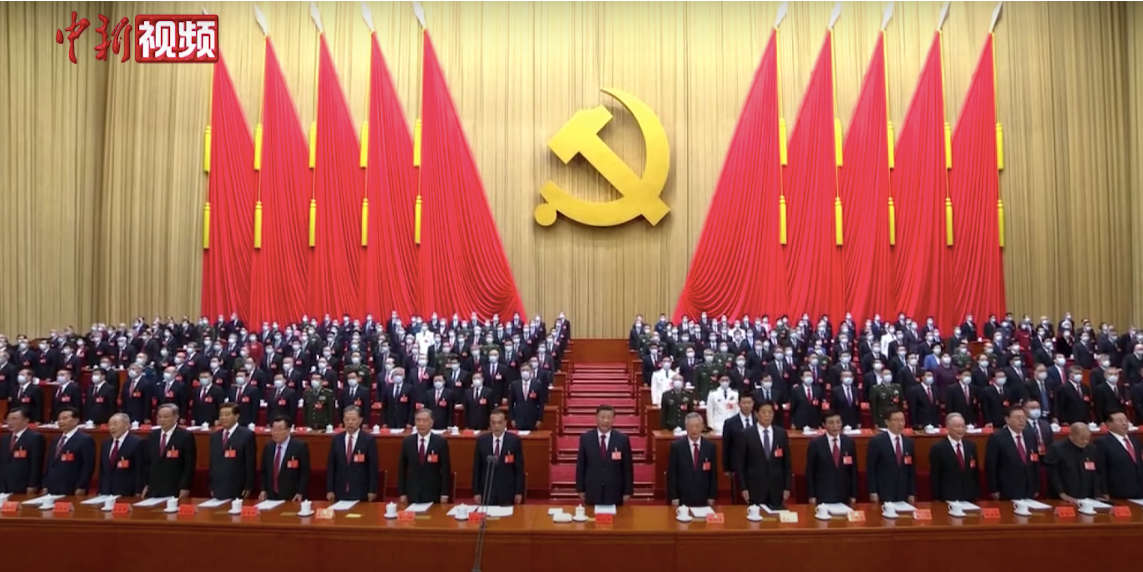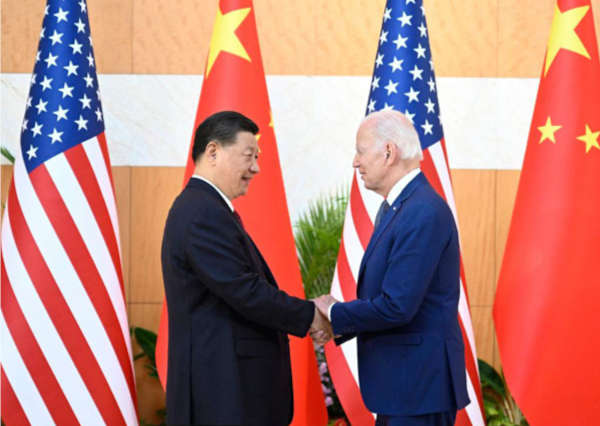In the picture
Opening session of the 20th National Congress of the Chinese Communist Party, in October 2022 [Chinese News Service].
In the wake of the 20th National Congress of the Chinese Communist Party (CCP), Xi Jinping has emerged as the most powerful man in China since Mao Zedong after securing a third term as the CCP's general secretary and conducting an overall restructuring of the party by appointing known "Xi loyalists" to top positions within the Politburo Standing Committee (PSC).
In his opening address on 16th October, Xi stressed the importance of the upcoming five years for China's ambitions both domestically and internationally as he called the need for: increased technological self-reliance, harsher COVID-19 policies, tighter domestic economic policies and faster military expansion to repel "separatist movements" within Taiwan and achieve a full Chinese reunification.
Xi's diary for the upcoming decade revolves around his dream of the "great rejuvenation of the Chinese nation." Notably enough, his dream not only encompasses China's regional sphere of influence in the Indo-Pacific but also advocates for increased Chinese influence in the international playing field as a leader of global governance and economic development.
Xi Jinping's third consecutive election as general secretary of the party and the replacement of the majority of members of the PSC implies a transformation of Chinese foreign and domestic policy. Under such circumstances, the objective of this analysis is to evaluate the implications of Xi Jinping's restructuring of the foundation of the CCP for both short term and long-term policy as well as evaluate the international response from major powers towards such.
Domestic implications for China
The removal of former Chinese president, Hu Jintao, and the exclusion of multiple high-ranking contenders from the PSC (former premier Li Keqiang, Li Zhanshu, Wang Yang, and Han Zheng) suggest a profound shift towards "Xi's new era" which heavily mirrors Maoist China.
As the re-elected general secretary, Xi used the 20th National Congress as a way to cleanse the CCP of any members who oppose his staff view on how China should evolve politically, socially, economically and militarily. The results send a clear message to the Chinese people: Xi Jinping faces absolutely no opposition within the government to carry out his long-term diary for China. Xi's new era for China includes a series of domestic reforms in terms of politics, economics and culture which will reshape Chinese civil society as a way to cement the longevity of the CPC long after his reign.
Firstly, throughout his opening address, he continuously stresses the need for cultural consolidation within Chinese borders. Xi's vision for the future of China incorporates the unity of the Chinese people regardless of ethnic or religious differences to create a "collective working force with one heart and one mind to realize the Chinese dream." But at the same time, the Xi-era will witness the integration of "Chinese traditional culture" into all aspects of civil society to "carry on China's cultural heritage." In this sense, Chinese society (just like the CCP) will undergo its very own "cleansing" in which Xi's new government will strive to create a homogenous civil society made up of ethnic Han Chinese citizens who are loyal to the party and its Marxist ideals.
But his ambitions to create a homogenous society do not only include the current political borders of China. Xi's dream of the "great rejuvenation of the Chinese nation" implies that under his leadership China will see the reintegration (politically, culturally and economically) of historically disputed and/or autonomous territories: Hong Kong, Macau, Taiwan and the Depsang Plains. Given that Xi has gone to great lengths to reshape the internal structure of the CCP and PSC, it becomes clear that he plans to achieve his objectives within the near future (most likely within the next decade).
However, Xi is also aware that he needs a very well developed, technologically advanced and highly trained military in order to fulfill his ambitions. The Chinese military will undergo some deep reform in the areas of training, logistics, personnel and equipment in an attempt to create a military culture within China to promote Xi's interests. Given China's internal instability due to ethnic, political, social and religious differences, military development is crucial for the fulfillment of Xi's ambitions. The unconditional support of a well-developed military will safeguard China's "territorial integrity, unity and sovereignty."
International implications
The newly established PSC and the difference in language used during Xi Jinping's opening address at the conference imply a significant shift towards the assertiveness of Chinese foreign policy for the upcoming decades.
Only subordinate to the general secretary of the party, the Politburo Standing Committee (PSC) is the maximum authority of political power within China. The fact that the committee is now exclusively composed of known Xi-loyalists indicates that Xi Jinping is aware that China's development is a threat to the established powers of the West and is thus going into a period of greater struggle. Due to this, he needs a cemented support system within the party to carry out an effective pursuit of his key interests. The need for this support systems also comes at a time in which China's interests directly contradict those of other countries (particularly the US, the EU and ASEAN) which is why counting with the full support of the highest authority within government is an indispensable element needed so Xi may use every weapon at his disposal (economic, political, military or diplomatic) to execute his diary.
At the same time, the particular language used throughout the address reveals Xi's view that China has entered a period of development with "strategic opportunities, risks and challenges" which is why they must be prepared to withstand "high winds, choppy waters, and even dangerous storms." The use of such language conveys the message that China is willing to take any measures necessary to achieve its main goals at a time when it's strategically beneficial to it while also preparing itself to resist any sort of foreign interference. Through this, it becomes clear that Chinese foreign policy will embrace turbulent bilateral and multilateral relations as a way to achieve their main interests for the near future.
But a change in the trajectory of foreign policy is not the only significant change of outlook as to which Xi alluded to throughout his address. He also emphasized his goal to internationally project the advantages of the Chinese political and economic system to reshape global governance in a way that benefits Chinese interests. Throughout the entire address, Xi alluded to the fact that China is still a developing country which fundamentally sets it apart from the already established powers of the West as a more appealing candidate to lead the developing world into a period of modernization. This implies that Xi's ambitions for the future include installing China as an international superpower with global influence as a replacement of the West.
And in a final attempt to set China apart from Western powers, Xi emphasized China's "defensive national defense policy" under which he states that China will never impose its ideals upon other countries or seek expansionism. But rather, seek to serve as a pioneer of global change through modernization, innovation and cooperation.


